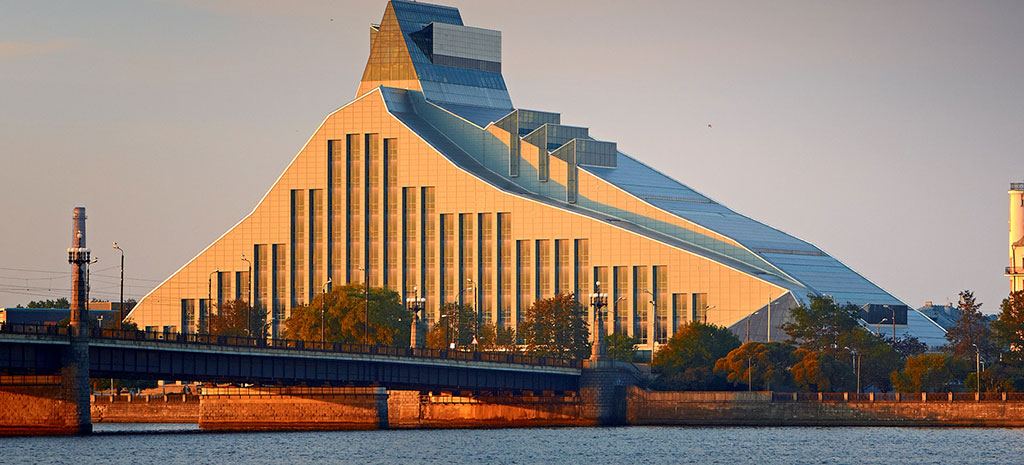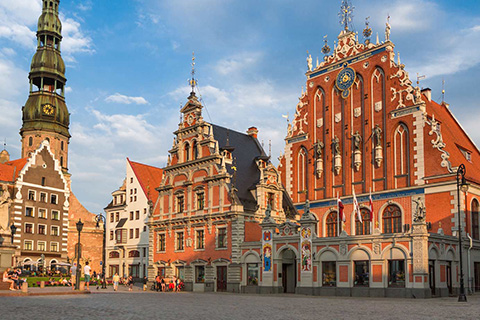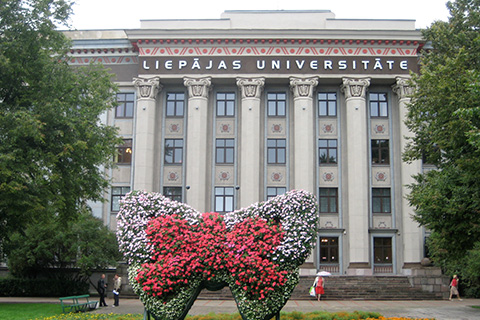
Study in Latvia
Last edited on 04 Mar 2026
Welcome to Latvia!
With beautiful forests, rivers and lakes, dynamic cities and a fascinating and multi-ethnic culture, Latvia has something for everyone, and has been called “Europe’s best-kept secret”. Located at the crossroads of Northern and Eastern Europe, Latvia has been influenced both linguistically and culturally by neighbors such as Lithuania and Estonia, while retaining its own distinct national identity and traditions.
Latvia, member of the European Union since 2004 and member of the Eurozone since 2014, is a wonderful place to study with a very affordable cost of living compared to other countries in Europe. Whether you intend to study in Latvia a bachelor's, master's or PhD degree, Latvian institutions provide international students with a varied range of fields of study. And don't be discouraged by the language. You may also study in Latvia in English and other foreign languages.
Higher Education System
There is academic and professional higher education in Latvia. Most of the institutions of higher education offer both academic and professional higher education qualification.
Academic higher education programs are tended to prepare graduates for independent research, as well as to provide theoretical background for professional activities. Academic education programs are implemented according to the national standard of academic education. They usually comprise a thesis at the end of each stage and lead to bachelor’s degree and master’s degree.
Professional higher education programs are tended to provide in depth knowledge in a particular field, preparing graduates for design or improvement of systems, products and technologies, as well as to prepare them for creative, research, and teaching activities in this fields. In total the duration of professional/vocational study programs is not less than 4 years after secondary education and not less than 2 years after college education.
Duration of bachelor’s program maybe for 3 or 4 years. The total length of fulltime bachelor and master studies is not less than 5 years. Doctoral studies last 3-4 full time years.
Student Cities in Latvia
Riga

Many international students looking to study in Latvia will be keen to spend time in the country’s capital. Rich in culture, architecture and a range of attractions, Riga is also the largest city in the country, home to around 700,000 people (more than a third of the nation’s overall population). Riga was a European Capital of Culture in 2014 and is famous for its mix of fantastic architecture both old and new, including what is thought to be the largest collection of art nouveau buildings in the world. The city is one of the key economic and financial centers in the Baltic region and generates more than half of the country’s GDP. Riga’s historic center, Vecrīga, is a UNESCO World Heritage Site which is famous for its medieval churches and cathedrals.
Riga is also a center of higher education, home to a wide range of universities. As well as the three highest-ranked Latvian universities – the University of Latvia, Riga Technical University (RTU) and Riga Stradins University (RSU) – Riga is also home to the Stockholm School of Economics in Riga, which offers all courses in English, the Latvian University of Agriculture, and the Art Academy of Latvia.
Daugavpils
Daugavpils is Latvia’s second-largest city, home to around 95,000 people and located in the south-east of the country. Daugavpils’ name literally translates to ‘Daugava Castle’ and like Riga, the city also has a historic center with a rich architectural heritage, and is particularly known for its red brick buildings. A multi-ethnic city, Daugavpils has a large number of Russian speakers and is an important cultural center in eastern Latvia, often hosting music events and festivals. Dauvavpils is home to Daugavpils University, and Riga Technical University has an affiliate located here.
Liepāja

The country’s third-largest city with around 82,000 inhabitants, Liepāja is located on the west coast, overlooking the Baltic Sea. Its pristine Blue Flag beaches make it an ideal destination either to study in or to visit during your studies for a seaside break. In terms of culture, iepaja is often called the capital of Latvian rock music and has three concert halls, as well as many events throughout the summer, including the massive ‘Summer Sound’ beach party. Recent years have seen a significant amount of investment in higher education development and quality in Liepāja, and again a branch of Riga Technical University can be found in the city.
Application, Fees and Visas in Latvia
Tuition fees and living costs Applying to study in Latvia
Tuition fees at Latvian universities vary depending on the institution, program, and where you’re from – non-EU students usually pay more than EU/EEA and Swiss students. In general you should expect to pay €3,000-5,000 (~US$3,300-5,540) per year for an undergraduate degree. Courses such as dentistry and medicine are more expensive, costing up to €15,000 (~US$16,600) a year. At master’s level, most courses range between €1,700 (~US$1,900) per year for EU/EEA and Swiss citizens and about €3,700 (~US$4,100) for all other overseas students.
Living costs are lower than in many other European countries. You’ll need to budget €5,400-8,400 (~US6,000-9,300) to cover everything including food (up to €250 per month), accommodation, travel and other personal expenses. Most Latvian universities have student halls of residence, which is likely to be the cheapest accommodation option. If you want to travel beyond Latvia to explore neighboring countries such as Russia or Estonia, you’ll of course need to budget more.
How to apply to Latvian universities
Each university’s admission procedures vary, but generally in order to apply to study in Latvia, you’ll first need to have your educational documents (academic transcript, degree certificate/diploma) certified to show that you’re eligible to apply. You should therefore send the appropriate documents to your chosen university’s admission office. The university will guide you through the process and inform you of what exams you need to pass, including any language test result/s (such as IELTS or TOEFL if you want to study in English). You may also have a video interview and/or need to submit your CV or a personal statement.
Once your eligibility is confirmed and you’ve been accepted, you’ll receive a conditional acceptance letter, receive and sign an agreement, and pay your tuition fees for the first year of study (some institutions may ask for a security deposit).
Applying for a Latvian student visa Latvian student visa
Once you’ve successfully and enrolled and paid your fees, your university will inform you of what you need to do next to gain a Latvian student visa and residence permit, and may apply for these on your behalf. Citizens of the European Union (EU) do not need a visa to study in Latvia, but will need to obtain a residence permit within three months of arrival, which in most cases will be applied for by your university. It’s mandatory for all students to have health insurance which covers you for the entire duration of your intended stay.
Non-EU students will need to apply for a visa and residence permit, and should apply for these in plenty of time before the course start date. Once accepted by a Latvian university, you’ll need to submit the required documents to your nearest Latvian embassy (you can search for yours here). If there is no Latvian embassy in your country, you should contact your university for advice on how to proceed.
The usual documents you need to present for your Latvian student visa are:
- Completed application form
- Passport photo
- Original copy of passport
- Original copy of your study agreement, showing you’ve been admitted to a Latvian university
- Academic record
- Proof you’ve paid your tuition fees (provided by the receiving university)
- Bank statement showing you have enough funds to support yourself during your studies
- Rental agreement or guarantee letter from the university concerning your prospective accommodation
- Proof that you’ve arranged adequate health insurance
- Statement on fluorography or X-ray examining results
Fast fact
- Population of around two million people
- Official language is Latvian, but Russian and English are also widely spoken (46% of Latvians can speak English)
- Capital and largest city: Riga
- Official name: Republic of Latvia
- One of the world’s greenest countries, with over 44% of its territory covered by forests
- Borders with Estonia to the north, Lithuania and Belarus to the south, Russia to the east and the Baltic Sea to the west
- Founded on 18 November 1918
- Became a member of the European Union and NATO in 2004
- Currency was previously the Latvian lats, but switched to the euro in 2014.
- A democratic parliamentary republic; as of 2016, the prime minister is Maris Kucinskis.
- Time zone: GMT (Greenwich Mean Time) +2, from April to November – GMT +3
- Vehicles drive on the right.
- Home to four natural parks and the widest waterfall in Europe (Venta Rapid)
- Ice hockey is the most popular sport in Latvia.
- Total land area of 63,589 sq km
- The largest religion is Christianity, with 79% of the population identifying with this.





